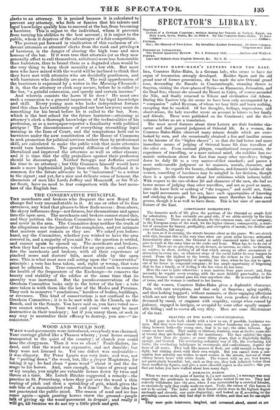THE CONSERVATIVE PRINCIPLE.
THE merchants and brokers who frequent the new Royal Ex thange feel very uncomfortable in it. At one or other of its four entrances, any wind that pleases to blow finds access : from above, the skyey influences drop—not fatness, but rheumatisms and agues into the open area. The merchants and brokers cannot stand this, and they petition the Gresham Committee to erect break-winds and cover in the area. The Committee deny neither the truth of the allegations nor the justice of the complaints, and yet intimate that matters must remain as they are. We asked you before- hand, say the Committee, whether you wished to have the area covered in, and a majority of you said No: the question is settled, and cannot again be opened up. The merchants and brokers, when they had no experience, voted for an open area ; and there- fore the merchants and brokers, with all their experience of pinched noses and doctors' bills, must abide by the open area: This is what most men call acting upon the "conservative" principle : a vote has been taken, and, right or wrong, that vote must be adhered to. True conservatism would seek to conserve the health of the frequenters of the Exchange—to conserve the beauty and stability of the edifice at the same time that its amenity was increased. But the pseudo-conservatism of the Gresham Committee looks only to the letter of the law : a vote once taken is with them like the law of the Medes and Persians. They seek to conserve "resolutions," heedless of bodies, buildings, or revenues. This kind of conservatism is not confined to the Gresham Committee ; it is to be met with in the Church, on the Bench, and in the Senate. You have said so, you have voted so— you cannot retract. Your word and your vote may be most destructive in their tendency ; but if you unsay them, or seek in any wey to neutralize their efficacy to destroy, you are—" in-


























 Previous page
Previous page